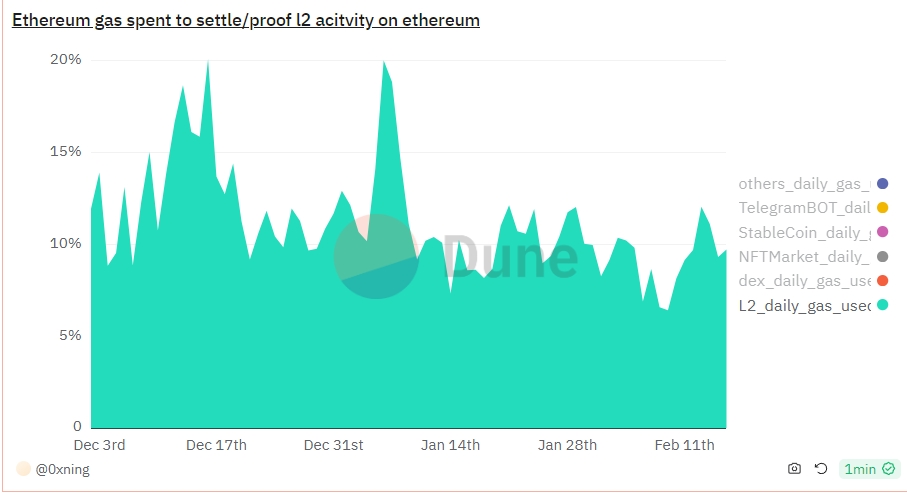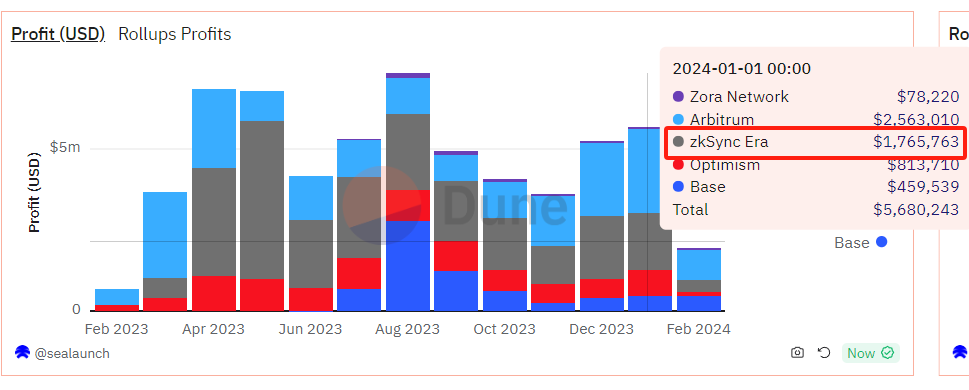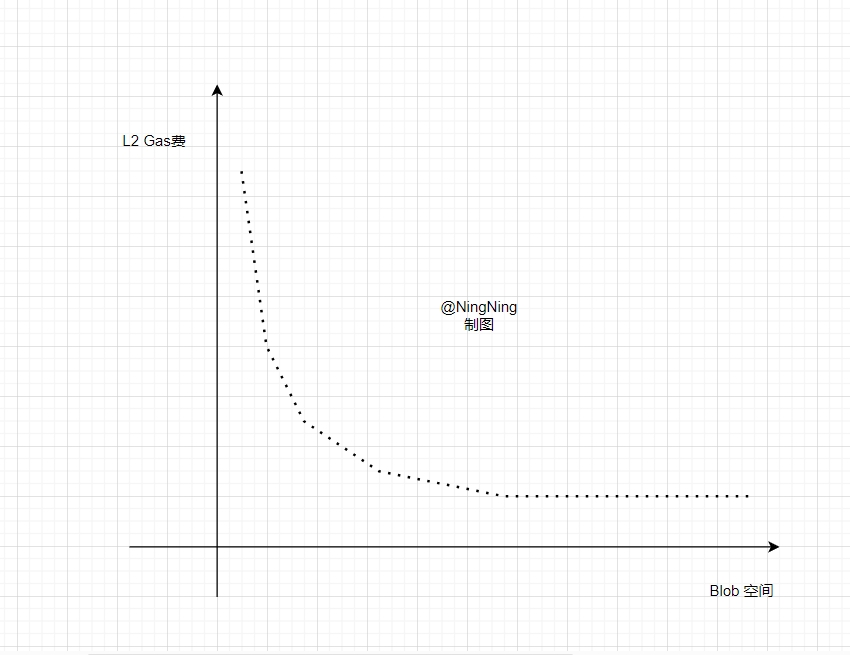 web3.0
web3.0
 After the Cancun upgrade, will the gas fee of Ethereum L2 really be reduced by more than 90%?
After the Cancun upgrade, will the gas fee of Ethereum L2 really be reduced by more than 90%?
After the Cancun upgrade, will the gas fee of Ethereum L2 really be reduced by more than 90%?
#Today’s market has a consensus: after the Cancun upgrade, the average gas fee of Ethereum L2 will be reduced by 10 times or even more high.
After the deployment of the upgraded core protocol EIP4844 in Cancun, the Ethereum mainnet will add 3 blob spaces dedicated to storing L2 transactions and state data. These blob spaces have independent Gas Fee markets. The estimated maximum storage state data size of each Blob space is approximately equal to one mainnet block, which is approximately 1.77M.
The current daily gas consumption of the Ethereum main network is 107.9b, and the Gas consumption of Rollup L2 accounts for ~10%.
According to the supply and demand curve of economics:
Price = total demand/total supply,
Assume that Rollup after Cancun is upgraded The total gas demand of L2 remains unchanged, and the block space that Ethereum can sell to L2 has changed from ~10% of the current 1 block to 3 complete Blob blocks, which is equivalent to the total supply of block space. If expanded by 30 times, the price of Gas will be reduced to 1/30 of the original value.
But this conclusion is not reliable because it presupposes too many linear relationship assumptions and abstracts away too many detailed factors that should be included in the calculation and consideration, especially the relationship between Rollup L2 The impact of competition and gaming strategies in the Blob space on Gas prices.
Rollup L2's gas fee consumption is mainly composed of two parts: data availability storage fee (status data storage fee) and data availability verification fee. Among them, data availability storage costs currently account for ~90%.
After the Cancun upgrade, for Rollup L2, the three new Blob blocks are equivalent to three new public lands. According to Coase's commons theory, in a market environment with completely free competition in the Ethereum Blob space, there is a high probability that the currently leading Rollup L2 players will abuse the Blob space. This can ensure their market position on the one hand, and squeeze the living space of competitors on the other.
The following figure shows the profit statistics of 5 Rollup L2s for one year. It can be found that their monthly profit scale shows obvious seasonal changes, but there is no obvious overall growth trend.
In such an involution market with a ceiling limit, Rollup L2 is in a state of zero-sum game that has been highly tense. There is fierce competition among developers, funds, users and DApps. After the upgrade of Cancun, they are fiercely competing for three additional blob spaces.
In the market situation of "there is only so much meat, if others eat one more bite, you will eat one less bite", it is difficult for Rollup L2 to achieve the ideal situation of Pareto optimality.
How will the leading Rollup L2s abuse the Blob space?
Personally guessed that the head Rollup L2 will modify the Batch frequency of the Sequencer, shortening the current Batch once every few minutes to once every 12 seconds, in line with the Ethereum main network block generation The speed remains synchronized. This can not only improve the quick confirmation of transactions on your own L2, but also occupy more blob space to suppress competitors.
Under this competitive strategy, the verification fee and Batch fee in the Gas fee consumption structure of Rollup L2 will surge. This will limit the positive impact of additional blob space on L2 gas fee reduction.
The results are shown in the figure above. When the Blob space increases, the positive impact on L2 Gas fee reduction will decrease at the margin. And after reaching a certain threshold, it will almost fail.
Based on the above analysis, I personally judge that the gas fee of Ethereum L2 will decrease after the Cancun upgrade, but the degree of decrease will be less than market expectations.
The above is the detailed content of After the Cancun upgrade, will the gas fee of Ethereum L2 really be reduced by more than 90%?. For more information, please follow other related articles on the PHP Chinese website!

Hot AI Tools

Undresser.AI Undress
AI-powered app for creating realistic nude photos

AI Clothes Remover
Online AI tool for removing clothes from photos.

Undress AI Tool
Undress images for free

Clothoff.io
AI clothes remover

Video Face Swap
Swap faces in any video effortlessly with our completely free AI face swap tool!

Hot Article

Hot Tools

Notepad++7.3.1
Easy-to-use and free code editor

SublimeText3 Chinese version
Chinese version, very easy to use

Zend Studio 13.0.1
Powerful PHP integrated development environment

Dreamweaver CS6
Visual web development tools

SublimeText3 Mac version
God-level code editing software (SublimeText3)

Hot Topics
 Top 10 Digital Virtual Currency Apps Rankings: Top 10 Digital Currency Exchanges in Currency Circle Trading
Apr 22, 2025 pm 03:00 PM
Top 10 Digital Virtual Currency Apps Rankings: Top 10 Digital Currency Exchanges in Currency Circle Trading
Apr 22, 2025 pm 03:00 PM
The top ten digital virtual currency apps are: 1. OKX, 2. Binance, 3. gate.io, 4. Coinbase, 5. Kraken, 6. Huobi, 7. KuCoin, 8. Bitfinex, 9. Bitstamp, 10. Poloniex. These exchanges are selected based on factors such as transaction volume, user experience and security, and all provide a variety of digital currency trading services and an efficient trading experience.
 What is a quantum chain? What are the quantum chain transactions?
Apr 21, 2025 pm 11:51 PM
What is a quantum chain? What are the quantum chain transactions?
Apr 21, 2025 pm 11:51 PM
Quantum Chain (Qtum) is an open source decentralized smart contract platform and value transmission protocol. 1. Technical features: BIP-compatible POS smart contract platform, combining the advantages of Bitcoin and Ethereum, introduces off-chain factors and enhances the flexibility of consensus mechanisms. 2. Design principle: realize on-chain and off-chain data interaction through main control contracts, be compatible with different blockchain technologies, flexible consensus mechanisms, and consider industry compliance. 3. Team and Development: An international team led by Shuai Chu, 80% of the quantum coins are used in the community, and 20% rewards the team and investors. Quantum chains are traded on Binance, Gate.io, OKX, Bithumb and Matcha exchanges.
 How to trade quantum chains
Apr 21, 2025 pm 11:42 PM
How to trade quantum chains
Apr 21, 2025 pm 11:42 PM
The quantum chain (Qtum) transaction process includes three stages: preliminary preparation, purchase and sale. 1. Preparation: Select a compliant exchange, register an account, perform identity verification, and set up a wallet. 2. Purchase quantum chains: recharge funds, find trading pairs, place orders (market orders or limit orders), and confirm transactions. 3. Sell quantum chains: Enter the trading page, select the trading pair and order type (market order or limit order), confirm the transaction and withdraw cash.
 What are the digital currency trading apps suitable for beginners? Learn about the coin circle in one article
Apr 22, 2025 am 08:45 AM
What are the digital currency trading apps suitable for beginners? Learn about the coin circle in one article
Apr 22, 2025 am 08:45 AM
When choosing a digital currency trading platform suitable for beginners, you need to consider security, ease of use, educational resources and cost transparency: 1. Priority is given to platforms that provide cold storage, two-factor verification and asset insurance; 2. Apps with a simple interface and clear operation are more suitable for beginners; 3. The platform should provide learning tools such as tutorials and market analysis; 4. Pay attention to hidden costs such as transaction fees and cash withdrawal fees.
 How long does it take to recharge digital currency to arrive? Recommended mainstream digital currency recharge platform
Apr 21, 2025 pm 08:00 PM
How long does it take to recharge digital currency to arrive? Recommended mainstream digital currency recharge platform
Apr 21, 2025 pm 08:00 PM
The time for recharge of digital currency varies depending on the method: 1. Bank transfer usually takes 1-3 working days; 2. Recharge of credit cards or third-party payment platforms within a few minutes to a few hours; 3. The time for recharge of digital currency transfer is usually 10 minutes to 1 hour based on the blockchain confirmation time, but it may be delayed due to factors such as network congestion.
 Recommend several apps to buy mainstream coins in 2025 latest release
Apr 21, 2025 pm 11:54 PM
Recommend several apps to buy mainstream coins in 2025 latest release
Apr 21, 2025 pm 11:54 PM
APP software that can purchase mainstream coins includes: 1. Binance, the world's leading, large transaction volume and fast speed; 2. OKX, innovative products, low fees, high security; 3. Gate.io, a variety of assets and trading options, focusing on security; 4. Huobi (HTX), low fees, good user experience; 5. Coinbase, suitable for novices, high security; 6. Kraken, safe and compliant, providing a variety of services; 7. KuCoin, low fees, suitable for professional traders; 8. Gemini, emphasizes compliance, and provides custodial services; 9. Crypto.com, providing a variety of offers and services; 10. Bitstamp, an old exchange, strong liquidity,
 The latest updates to the oldest virtual currency rankings
Apr 22, 2025 am 07:18 AM
The latest updates to the oldest virtual currency rankings
Apr 22, 2025 am 07:18 AM
The ranking of virtual currencies’ “oldest” is as follows: 1. Bitcoin (BTC), issued on January 3, 2009, is the first decentralized digital currency. 2. Litecoin (LTC), released on October 7, 2011, is known as the "lightweight version of Bitcoin". 3. Ripple (XRP), issued in 2011, is designed for cross-border payments. 4. Dogecoin (DOGE), issued on December 6, 2013, is a "meme coin" based on the Litecoin code. 5. Ethereum (ETH), released on July 30, 2015, is the first platform to support smart contracts. 6. Tether (USDT), issued in 2014, is the first stablecoin to be anchored to the US dollar 1:1. 7. ADA,
 What does cross-chain transaction mean? What are the cross-chain transactions?
Apr 21, 2025 pm 11:39 PM
What does cross-chain transaction mean? What are the cross-chain transactions?
Apr 21, 2025 pm 11:39 PM
Exchanges that support cross-chain transactions: 1. Binance, 2. Uniswap, 3. SushiSwap, 4. Curve Finance, 5. Thorchain, 6. 1inch Exchange, 7. DLN Trade, these platforms support multi-chain asset transactions through various technologies.







